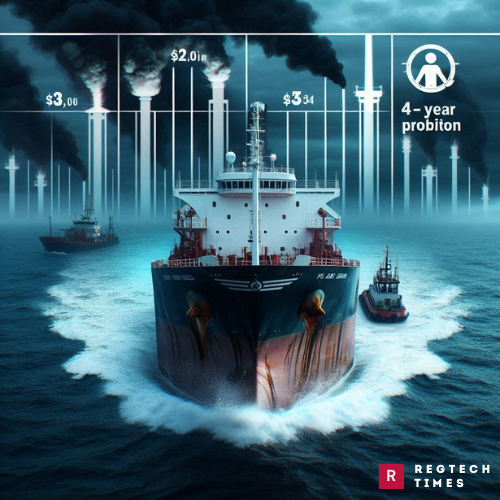In a significant development in the realm of maritime environmental law, two related companies, Prive Overseas Marine LLC and Prive Shipping Denizcilik Ticaret, have pleaded guilty to environmental crimes. The companies operated the motor tanker PS Dream, which has now become the center of a high-profile legal case.
Charges and Violations
The charges against the companies include conspiracy, knowingly violating the Act to Prevent Pollution from Ships (APPS), and obstruction of justice. These charges are related to the falsification of the tanker’s Oil Record Book, a required log that records all operations related to oil in machinery spaces.
The case came to light when a crew member reported a video showing oil being pumped overboard and trailing behind the tanker. This act is a direct violation of APPS, which prohibits the discharge of oil or oily mixtures into the sea from ships, unless certain conditions are met.
Legal Proceedings and Penalties
The guilty pleas were submitted in federal court in New Orleans before Chief U.S. District Court Judge Nannette Jolivette Brown. If the court approves the plea agreement, the companies will face a total fine of $2 million and a four-year probation period. This hefty fine underscores the seriousness with which such environmental crimes are treated.
Further charges have been filed against Captain Abdurrahman Korkmaz, a Turkish national who was the ship’s master. The charges against the captain highlight the individual accountability that can be enforced in such cases, in addition to corporate responsibility.
Environmental Responsibilities in the Maritime Industry
This case serves as a stark reminder of the environmental responsibilities that come with operating commercial vessels. The maritime industry has a significant impact on the environment, particularly in terms of air and water pollution. As such, strict regulations are in place to mitigate this impact and ensure the sustainability of our oceans.
The Act to Prevent Pollution from Ships is one such regulation. It enforces the provisions of the International Convention for the Prevention of Pollution from Ships (MARPOL), the primary international agreement aimed at preventing marine pollution caused by ships, whether through operational or accidental means.
The Impact of the Case
The case of the PS Dream is a clear demonstration of the commitment of the Justice Department to prosecute those who violate maritime laws intended to prevent pollution from ships. It sends a strong message to other operators in the industry about the consequences of non-compliance with environmental regulations.
This case also highlights the importance of whistleblowers in uncovering environmental crimes. The crew member who reported the video played a crucial role in bringing these violations to light. This underscores the need for a culture of transparency and accountability within the maritime industry.
The Role of Whistleblowers
Whistleblowers play a critical role in the enforcement of environmental laws and regulations. In this case, the crew member who reported the video of oil being discharged into the sea was instrumental in bringing the violations to the attention of the authorities. This highlights the importance of creating a safe and supportive environment for whistleblowers in the maritime industry.
The Future of Maritime Environmental Law
The case of the PS Dream is likely to have far-reaching implications for the maritime industry. It serves as a stark reminder of the severe penalties that can be imposed for violations of environmental laws and regulations. It also underscores the importance of maintaining accurate records and logs, as falsification of these documents can lead to additional charges and penalties.
Conclusion
In conclusion, the guilty plea of the companies operating the PS Dream marks a significant milestone in the enforcement of maritime environmental law. It underscores the importance of adhering to environmental regulations and the severe consequences that can result from violations. As we move towards a more sustainable future, it is crucial that all stakeholders in the maritime industry, from operators to crew members, understand and uphold their environmental responsibilities.


